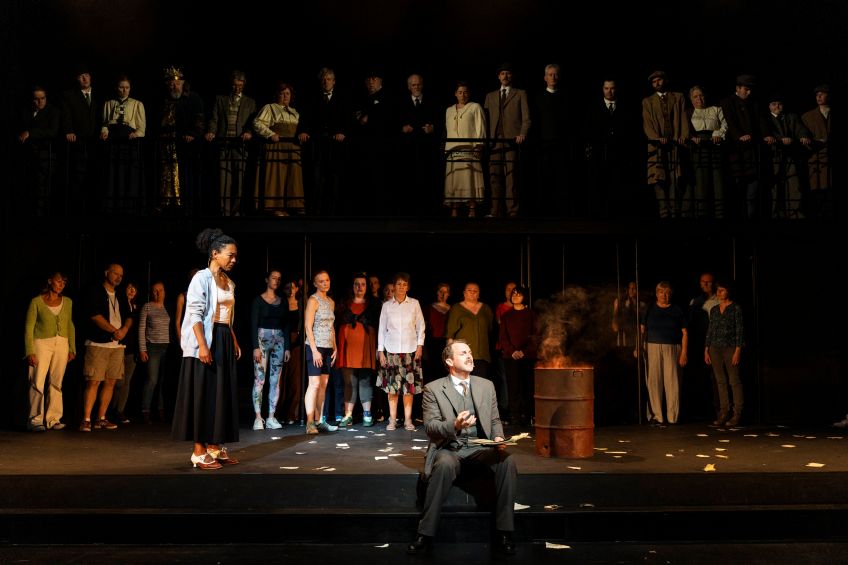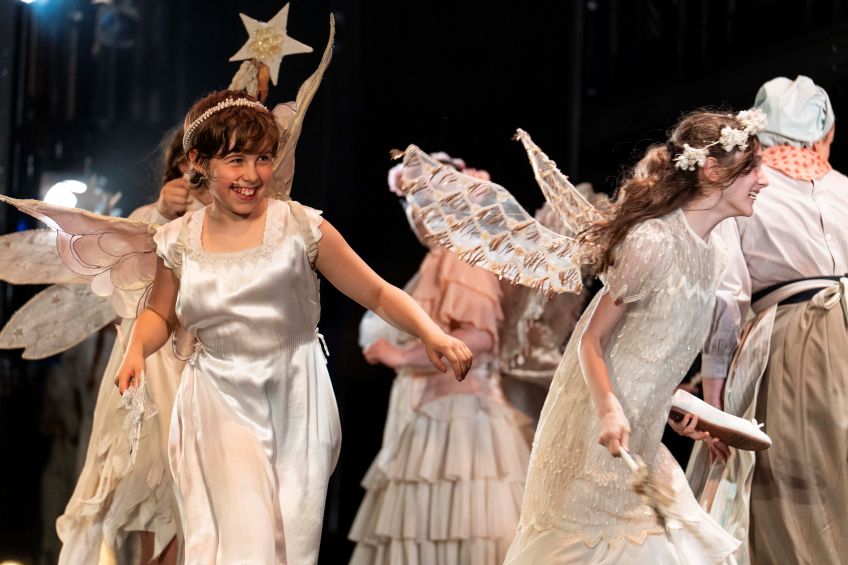Full of passion and beauty, His Last Report, produced by York Theatre Royal in association with Riding Lights Theatre Company, is a new play written by Misha Duncan Barry and Bridget Foreman. With a busy cast of dozens, magnificently deployed and integrated to impressive effect, this is a vibrant, fascinating, polished production. Exciting, innovative and determinedly thought-provoking, the staging is fabulous, the writing ambitious. Although full-on, wordy, worthy outpourings teeter on over-drives of blatant tub-thumping at times, to hammer home sharply-pointed messages, the play’s earnest enthusiasm entertains all the way, carrying the audience on an exhilarating back-and-forth journey. As historic eras alternate, mix and blend with our own twenty-first century world, a richness of music, movement and humour enhance throughout.
The play celebrates the life and legacy of Seebohm Rowntree and those who assisted him, especially the women, spinning back and forth, too, into the present day to see what’s happening to his legacy now. York Cocoa Works and Rowntree’s have had tastebuds in ecstasies for generations; treats like Kit-Kat, Quality Street, Aero, Smarties, Fruit Gums and Fruit Pastilles have long been household names. Though Nestle took over in 1988, Rowntree’s began as a family business in York in 1862 under Quaker Henry Isaac Rowntree, later partnered by his brother, Joseph. It was under Joseph’s son, Seebohm that the company burgeoned in the 1890s and became a worthy competitor for the likes of Cadbury. Seebohm is proudly revered and celebrated by the people of York, though, not primarily as an entrepreneur, manufacturer and profit-maker but as a philanthropist, influential social reformer and champion of the poor whose pioneering research and sturdy vision led to the eventual founding of our Welfare State. The findings in his welfare reports (1899, 1935 and 1951) fired up a steely determination to battle for fair wages, equality, better education and health provision for the poor.

Staging this local story with massive, national impact, is part of a colossal community project, involving hundreds of local people, young and old, in every creative aspect from the word go; as massed choir sings and hums with beauty and splendour from the gods at spot-on moments, others work/have worked behind the scenes or join the two professional actors onstage to sing, dance, act and perform in the splendidly co-ordinated ensemble or take roles as prime characters.
Professional actor and son of York, Antony Jardine, presents worthy Seebohm Rowntree as a serious, ever-earnest, formulae-loving chemist and industrialist, totally driven at every moment (as his poor wife notices) by a full-on passion for the principles he holds dear and by his optimistic conviction that poverty could soon be eradicated. Since Seebohm seeks no honour or self-glory and refuses to put profits before people, it’s up to his father, Joseph, played kind, warm, down-to-earth and principled by Mark Payton, to point out that profits are what provide the wherewithal to improve the lives of workers and communities. Joseph gets stuck in and makes excellent progress. The second professional actor is Amelia Donkor as Seebohm’s super competent, confident typist and secretary, Gulie Harlock, a woman experienced in far higher jobs than this and full of helpful ideas that expand on Seebohm’s own Eureka moments, Donkor playing Gulie calm, assertive, caring and highly amiable. Though the professionals do take the lion’s share in the piece, the acting of other main characters is strong all round.
Like Charles Booth who compiled his famous poverty maps following research in London (1886-1909), Seebohm Rowntree (1871-1954), determined to pinpoint and analyse the root causes of poverty and eradicate them, compiled extensive data on poverty in York. Both men concluded that 30% of the respective populations lived in a persistent cycle of poverty in a society riddled with inequality. Unlike better-offs in general, Rowntree realised the poor weren’t poor because they were all entirely feckless, idle, drunk and immoral: the poor, with their large families, simply couldn’t earn enough to make ends meet as wages were too low. The cycle of poverty needed breaking from outside. He also saw how health and quality of life suffered so much from cultural deprivation as well as financial. These things he could change, and he did.
Along with liveable minimum wage, pension and health care, he furnished his workers (though not to the liking of all!) with leisure-time sports and activities at little expense – libraries, choirs, sports-teams, bands, pageants, drama groups. And onstage, before our very eyes, to our wonder and amusement, the lives of happy, singing Rowntree workers and their mooing cows blossom and flourish, culminating in an Act I Finale that fills the stage to bursting with jugglers, acrobats, singers, Morris dancers, gymnasts and plenty more. Heartily played by bendy Christie Barnes, agile, trapeze-wrangling Brynhild Benson (or Dick) dangles centre-stage, a gymnastics teacher employed to help improve the workers’ health and well-being. In other scenes, Maurice Crichton brings fine, fun moments as King Lear aka Frank Benson, also conveying the earnest message that literature, drama, creativity and imagination are crucial in expanding a person’s capacity to feel, understand and empathise – in short, to develop true humanity.
Unfortunately, as at the play’s start, Seebohm fills with disillusion and despair to witness all his progress go into reverse when mass unemployment kicks in and the poverty cycle heads back to square one. He despairs that no lessons have been learned from history, a sentiment echoed whenever the play tips forward into our own century, where snatches of our current-day employment, care and health problems play out.

A handsome set, spot-on costumes and props and truly beautiful lighting are a triumph all round. On two distinct levels, the set allows various of the many, many scenes, sub-scenes, tableaux and cameos to play out simultaneously. Subtle lighting, sometimes of sublime Rembrandt beauty and artistry, pinpoints, for example, office/management meetings at a table on the balcony as impoverished families struggle to cope below, or lab technicians and armies of white-clad factory workers wheel out multiple trolleys to work on shelves of confectionary. Gauze screens and subtle smoke-use have further evocative effect, and when patterned railway seats roll forth for Seebohm to sit with the sturdy Winston Churchill (Colin Beveridge) and enthusiastic PM Lloyd George, played warmly Welsh and lovely by Andrew Wrenn, two side screens transmit clouds of steam, nicely evoking movement as the politicians take up Seebohm’s ideas and an incredulous, delighted, peak-capped guard clips their tickets.
Tardis-like, several simple, mobile, black frames deftly wheel about, through which characters, especially Seebohm, pass back and forth, sometimes to distorted time-warp sound effects, travelling from Victorian times, through twentieth century decades and on into the century beyond Seebohm’s own life, where he witnesses distressing nightmare scenes: a young mother clutches a crying baby, hanging on forever on a phone help-line – which never helps; a future version of a woman who was once a stalwart at his side, May Kendall, played sturdily by Rosy Rowley, is today abandoned, alone and inanimate in a wheelchair; meanwhile, ranks of soulless, colourless, grey-suited business managers praise cost-cutting “efficiencies” and zero-hour contracts that maximise profits, seeing workers as laughable, expendable commodities. The rounders bats they steal from the workers of the past as time lines blur become instruments of threat and menace in their hands. Bewildered by the back-and-forth complexities and ghostly visions of past and future, Seebohm even ends up at a read-through of the very play we’re watching. In clever, highly entertaining light relief, the other characters now become the actors discussing those characters. Antony Jardine, though, remains always the impassioned Seebohm.
Yes, it’s big, broad and very bonny. It’s all about then and it’s all about now. It’s fascinating, highly entertaining and incredibly well done. Bravo.
Eileen Caiger Gray




